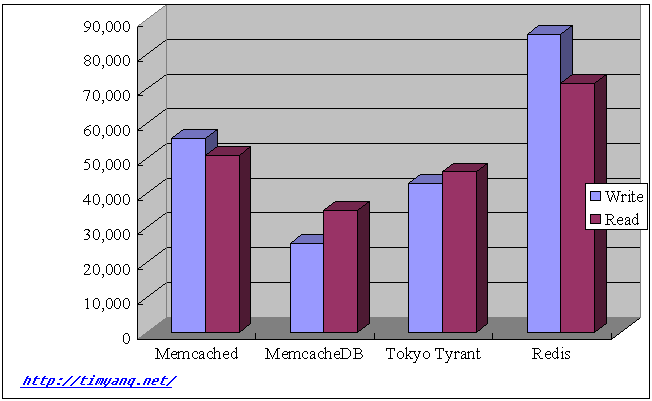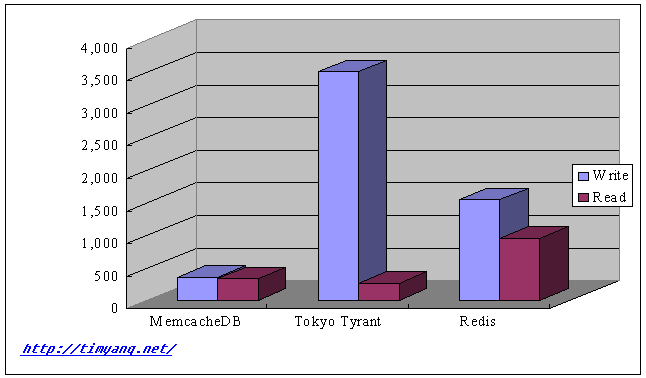很多同学可能熟知Memcached的LRU淘汰算法,它是在slab内部进行的,如果所有空间都被slabs分配,即使另外一个slab里面有空位,仍然存在踢数据可能。你可以把slab理解为教室,如果你的教室满了,即使别的教室有空位你的教室也只能踢人才能进人。

本文介绍的却是另外一种现象。今天监控发现线上一memcached发生数据被踢现象,用stats命令看evictions>0,因为以前也出现过此问题,后来对这个参数增加了一个监控,所以这次主动就发现了。由于给memcached分配的内存远大于业务存储数据所需内存,因此初步判断是“灵异现象”。
第一步,netstat查看所有连接,排除是否被一些未规划的client使用,经排查后断定无此可能。
第二步,用tcpdump抽样检查set的指令,排除是否有忘记设cache过期时间的client,初步检查所有典型的业务都有expire time。
第三步,Google,未果
第四步,看源代码,了解evictions计数器增加时的具体细节,oh, no…
in items.c, memcached-1.2.8,
125 for (search = tails[id]; tries > 0 && search != NULL; tries--, search=search->prev) {
126 if (search->refcount == 0) {
127 if (search->exptime == 0 || search->exptime > current_time) {
128 itemstats[id].evicted++;
129 itemstats[id].evicted_time = current_time - search->time;
130 STATS_LOCK();
131 stats.evictions++;
132 STATS_UNLOCK();
133 }
134 do_item_unlink(search);
135 break;
136 }
137 }
从源代码发现踢数据只判断一个条件,if (search->refcount == 0),这个refcount是多线程版本计数用,在当前服务器未启用多线程情况下,refcount应该始终为0,因此初步判断memcached是从访问队列尾部直接踢数据。
为了证实想法,设计以下场景:
- 部署一个memcached测试环境,分配比较小的内存,比如8M
- 设置1条永远不过期的数据到memcached中,然后再get一次,这条数据后续应该存在LRU队尾。
- 每隔1S向memcached set(并get一次) 1,000条数据,过期时间设为3秒。
- 一段时间后,stats命令显示evictions=1
按我以前的理解,第2步的数据是永远不会被踢的,因为有足够过期的数据空间可以给新来的数据用,LRU淘汰算法应该跳过没过期的数据,但结果证实这种判断是错误的。以上业务的服务器发生被踢的现象是由于保存了大量存活期短的key/value,且key是不重复的。另外又有一业务保存了小量不过期的数据,因此导致不过期的数据惨遭被挤到队列踢出。
本来这个问题就告一段落了,但在写完这篇文章后,顺便又看了新一代memcached 1.4.1的源代码,很惊喜发现以下代码被增加。
items.c, memcached 1.4.1
107 /* do a quick check if we have any expired items in the tail.. */
108 int tries = 50;
109 item *search;
110
111 for (search = tails[id];
112 tries > 0 && search != NULL;
113 tries--, search=search->prev) {
114 if (search->refcount == 0 &&
115 (search->exptime != 0 && search->exptime < current_time)) {
116 it = search;
117 /* I don't want to actually free the object, just steal
118 * the item to avoid to grab the slab mutex twice ;-)
119 */
120 it->refcount = 1;
121 do_item_unlink(it);
122 /* Initialize the item block: */
123 it->slabs_clsid = 0;
124 it->refcount = 0;
125 break;
126 }
127 }
重复进行上述测试,未发生evictions。
9/8 Update: 注意到L108的tries=50没有?试想把测试第2步设置51条不过期数据到cache中,情况会怎样?因此新版的Memcached也同样存在本文描述问题。
几条总结:
- 过期的数据如果没被显式调用get,则也要占用空间。
- 过期的不要和不过期的数据存在一起,否则不过期的可能被踢。
- 从节约内存的角度考虑,即使数据会过期,也不要轻易使用随机字符串作为key,尽量使用定值如uid,这样占用空间的大小相对固定。
- 估算空间大小时候请用slab size计算,不要按value长度去计算。
- 不要把cache当作更快的key value store来用, cache不是storage。


